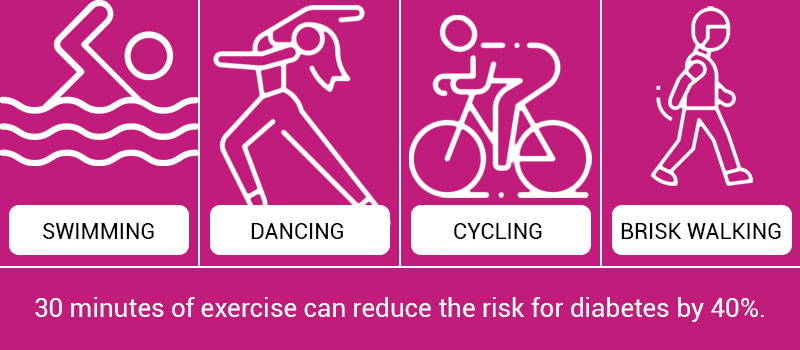Introduction
Every 10 seconds, someone dies from diabetes-related complications globally. An average Indian gets diabetes 10 years earlier than his/her Western counterpart. WHO says that in a low-income family group in India, 25% of the income goes in diabetic care.

Management of diabetes requires lifelong multifaceted treatment. Diabetes is a chronic disease which if not kept under strict control can slowly damage various systems of our body. Rehabilitation Medicine is a multidisciplinary approach which can help achieve optimal glycemic control, improve quality of life, prevent or lessen the complications and ultimately reduce mortality in patients with a diabetic condition.
What Is Rehabilitation?
Rehabilitation involves a team of medical specialists working in co-ordination towards achieving certain patient-centric goals. Role of rehabilitation might change at different stages of life for a patient with a diabetic condition.
What Can Rehabilitation Do in Diabetes?
Prevention

- Exercise Program: Physical activity improves glucose uptake in cells by increasing blood flow to muscle cells. It also improves sensitivity to insulin by reducing abdominal fat which is a known risk factor for insulin resistance. Graded progression of exercises and avoiding dehydration is important especially in hot and humid climate. As the insulin sensitivity improves with a regular exercise program you might need adjustment of medications with tendency for hypoglycemia.
- Diabetic Foot Care: Skin care and wound care reduce risk of infection and ulceration. Orthoses help to “off load” weight on foot or pressure area to promote healing and prevent skin damage.
- Recognizing and accepting changes in mood and physical ability.
- Regular eye check-up to recognize diabetic retinopathy.
Treatment

Rehabilitation team work in co-ordination to improve limitations in functional ability due to different complications of diabetes (like stroke, amputation, diabetic peripheral neuropathy & heart attack). Inpatient, outpatient or home-based rehabilitation programs are available where each team member has different roles.
- Rehabilitation Physician – Prescribing artificial limb (prosthesis) after amputation, optimizing diabetic control for prevention of recurrent stroke. Empowering patient by educating patient on the disease condition, complications and possible outcomes.
- Physiotherapy – Improving balance, strength, mobility and cardiopulmonary endurance.
- Occupational Therapy – Overall assessment and training in abilities of self-care and managing a changing environment (home modification, walking aids, etc.) to help the individual return to roles in the family or community. Activities to improve thinking ability.
- Speech Therapists – Assess swallow safety and prevent pneumonia in stroke.
- Dietician – Optimize nutrition for faster recovery and educate on diabetic diet.
- Psychologist – Help patient and family cope with limitation in functional ability.
- Prosthetist and Orthotists – Make appropriate artificial limbs and supportive devices.
- Podiatrists – Expert management of diabetic foot-related issues.

Care and Support
- Ongoing education and support including pain management, fall prevention, bone protection and psychosocial support for differently abled individuals.

Dr. Lakshmi Nair
Consultant – Physical Medicine & Rehabilitation
Kauvery Hospital Chennai
